7 Fantastic Benefits of Plum Juice

We have already considered the health benefits of Prune Juice. But what about Plum Juice? After all, Prunes are just dried Plums.
In this post we will examine some of the health benefits of Plum Juice and then we will compare these two essentially similar juices.
One of the main reasons that people look up the benefits of plum juice is related to constipation. Indeed, Plum Juice can help you if you are suffering from constipation, but there are many other potential benefits (and several side-effects) of plum juice besides helping you deal with this kind of issue.
I’ll quickly start out by saying that – should you be having problems with constipation – you could find prune juice helpful as well.
If you want to get a lasting solution to the issue, neither plum juice nor prune juice should be your choice. Then, I’d have to recommend using herbal supplements for colon cleansing instead.
Plum juice is packed with a range of vitamins, minerals, and nutrients. The juice extracted from plums helps to alleviate medical conditions like indigestion, macular degeneration, osteoporosis, diabetes, and more. In this post, you can learn about the nutritional value and health benefits plum juice.
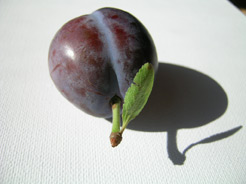 Plums are a member of the Rosaceae family. This family is large and includes apricots, peaches, and nectarines, with over 2,000 different shapes and color varieties. Plum juice is rich in antioxidants and dietary fiber that boost the digestive system and eliminate free radicals. These free radicals can damage the cells in various tissues and even make them cancerous.
Plums are a member of the Rosaceae family. This family is large and includes apricots, peaches, and nectarines, with over 2,000 different shapes and color varieties. Plum juice is rich in antioxidants and dietary fiber that boost the digestive system and eliminate free radicals. These free radicals can damage the cells in various tissues and even make them cancerous.
The most common color of Plum Juice is brown. But Plum juice is nutritious in any color, whether you’re drinking red, purple, or yellow plum juice.
The taste is very characteristic and watery. Buy them organic if you can, because Plums are regularly treated with pesticides and insecticides. In fact, the farmers in my region I have spoken to claim that even if they want to go low on chemistry, they have to do at least one round of spraying.
The plum, with its large pit center surrounded by soft and tasty flesh is a tasty and delicious fruit. Plums are native to China and were introduced to Europe by the Romans. The Spanish missionaries introduced them to North America. China, the United States, and the Russian Federation are the main producers of plums in the modern age.
The European varieties are smaller and less juicy and are typically used for producing Prunes and Prune juice. Their skin is purple blue, while the flesh is golden yellow.
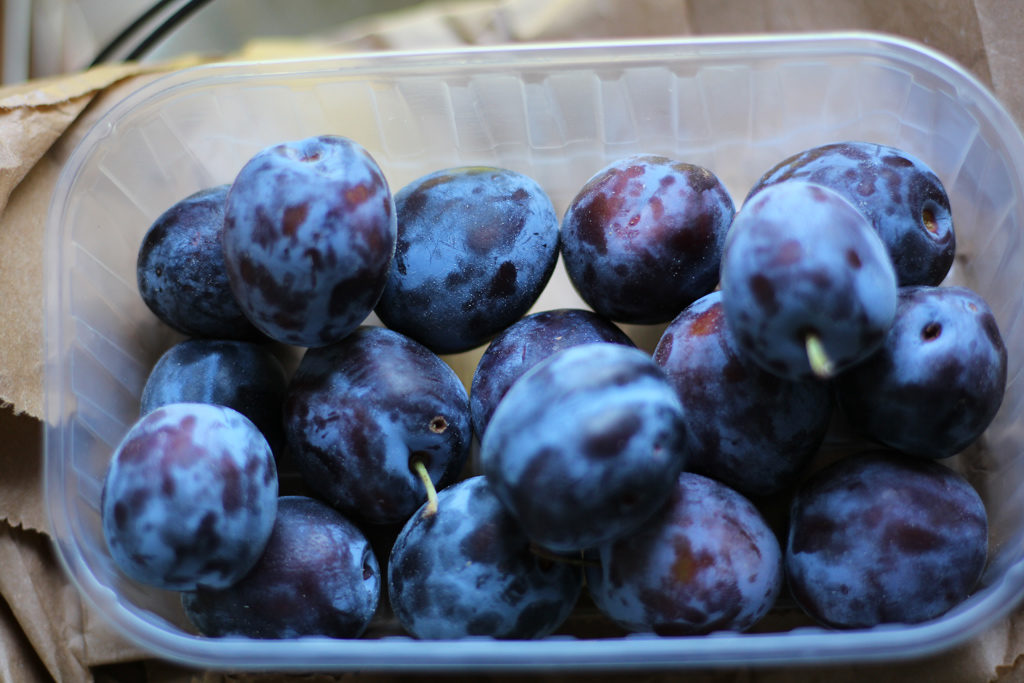
Table of Contents
- 1 Nutrition and Health Benefits
- 2 Heart Health
- 3 Cognitive Health
- 4 Anti Blood Clotting and Bone Health
- 5 Vision
- 6 Pregnancy
- 7 Constipation
- 8 Skin Care
- 9 The difference between Prune Juice and Plum Juice
- 10 How to Juice Plums
- 11 Ingredients
- 12 Instructions
- 13 Making June Plum Juice (Video)
- 14 Useful Tips
- 15 Possible Side Effects
- 16 The Bottom Line
- 17 References
- 18 Related Posts
Nutrition and Health Benefits
The dietary fiber of plum juice (especially if you just blend the produce) absorbs water while traveling through the digestive tract. This creates bulk that eliminates hunger pangs and leaves you feeling full. That’s great for people looking to lose weight because plum juice can help you to eat less and consume less calories overall. Plum juice is also rich in antioxidants that can further boost weight loss.
Plums are abundant in healthy nutrients, minerals, and vitamins. There’s vitamin C, vitamin A, vitamin B9 (folate), and vitamin K. Also, plums have decent amounts of other vitamins from the B complex, as well as vitamin E. From the more important nutrients, they contain phosphorous, potassium, iron, magnesium, and zinc.
It goes without saying that Plums don’t contain any harmful fats.
Here is the full list of nutrients, normalized per one cup:
- 77 calories
- 20 g. carbohydrate
- 1 g. protein
- 2 g. dietary fiber
- 0 fat
- 15 g. sugar
- 15 mg. vitamin C
- 10 micrograms vitamin K
- 550 IU vitamin A
- 0.01 mg. thiamin
- 0.01 mg. riboflavin
- 0.7 mg. niacin
- 8.3 mg. folate
- 0.01 mg. vitamin B6
- 0.2 mg. pantothenic acid
- 0.4 mg. vitamin E
- 259 mg. potassium
- 0.1 mg. manganese
- 0.1 mg. copper
- 11 mg. magnesium
- 0.3 mg. iron
- 26 mg. phosphorus
Heart Health
 Plums contain bio-active compounds classified as phenols. As many as 41 phenolic compounds have been detected in this fruit. [1]
Plums contain bio-active compounds classified as phenols. As many as 41 phenolic compounds have been detected in this fruit. [1]
Phenols have a strong action in the human body, working to eliminate the damaging effects of the free oxygen radicals. They damage cells and organs, oxidize cholesterol and spoil the fats that enter the composition of cellular membranes. The antioxidants of plum juice prevent the damage of cholesterol and triglycerides, thereby preventing heart attacks, strokes, and hypertension.
Cognitive Health
 The nutrients in Plum juice seem to support cognitive health. The mechanism seems to be related to reducing inflammation in the brain, promoting easier learning and better memory. This is reflected in preventing degenerative process in the brain that may lead to Parkinson’s and Alzheimer’s diseases. A study that supports these findings is related to investigations of the effects of poly-phenols in oriental plum varieties on the cognitive brain functions. [2] The researchers found that the incorporation of plums into one’s diet may lead to lower brain cholesterol levels and less neuro-degenerative related problems.
The nutrients in Plum juice seem to support cognitive health. The mechanism seems to be related to reducing inflammation in the brain, promoting easier learning and better memory. This is reflected in preventing degenerative process in the brain that may lead to Parkinson’s and Alzheimer’s diseases. A study that supports these findings is related to investigations of the effects of poly-phenols in oriental plum varieties on the cognitive brain functions. [2] The researchers found that the incorporation of plums into one’s diet may lead to lower brain cholesterol levels and less neuro-degenerative related problems.
Anti Blood Clotting and Bone Health
 As a result of the vitamin K content, Plum juice helps normal blood clotting. Vitamin K is also essential for the proper deposition of calcium and it helps bone health. Having some freshly squeezed plum juice may prevent vitamin K deficiency, strengthen your bones, and help remove calcium deposits from the arterial walls.
As a result of the vitamin K content, Plum juice helps normal blood clotting. Vitamin K is also essential for the proper deposition of calcium and it helps bone health. Having some freshly squeezed plum juice may prevent vitamin K deficiency, strengthen your bones, and help remove calcium deposits from the arterial walls.
Vision
 Plum juice is also great for eye health. It contains vitamin A to keep your eyes safe from diseases and infections. It also improves night vision, particularly in older people. It also halts the development of protracted vision loss.
Plum juice is also great for eye health. It contains vitamin A to keep your eyes safe from diseases and infections. It also improves night vision, particularly in older people. It also halts the development of protracted vision loss.
Pregnancy
 Pregnant women in the habit of drinking plum juice get a lot of vitamins C, and K, which is needed for cell division and bone development, preventing infections, and encouraging tissue growth throughout pregnancy, as well as preventing blood clots. However, during pregnancy you should consult with your clinician, as some aspect of Plum juice may be harmful (see the Side Effects section).
Pregnant women in the habit of drinking plum juice get a lot of vitamins C, and K, which is needed for cell division and bone development, preventing infections, and encouraging tissue growth throughout pregnancy, as well as preventing blood clots. However, during pregnancy you should consult with your clinician, as some aspect of Plum juice may be harmful (see the Side Effects section).
Constipation
 While plum juice tends to be less concentrated than prune juice, plum juice also has laxative properties. Constipation is defined as having three or less bowel movements within a week. It also makes it difficult to pass stool and makes it dry.
While plum juice tends to be less concentrated than prune juice, plum juice also has laxative properties. Constipation is defined as having three or less bowel movements within a week. It also makes it difficult to pass stool and makes it dry.
Plum juice is rich in isatin and sorbitol [3], which are shown to be better at treating constipation than psyllium husk (especially if you try to remedy the unhealthy habit of eating too much carbs and then going over the board with psyllium). Isatin and sorbitol both have the laxative effect encouraging fluid secretion in bowels and efficient flushing of waste through the colon. Plum juice also cleanses your intestines if consumed regularly.
Skin Care
 The antioxidants from Plum juice, including vitamin C and the anti-aging phyto-chemicals, help maintain healthy skin and improve its appearance. One very useful property of this juice is reducing wrinkles and dark spots. It is precisely because of this, plum extract is used in cosmetic products, face masks, beauty creams, and other skincare products in general.
The antioxidants from Plum juice, including vitamin C and the anti-aging phyto-chemicals, help maintain healthy skin and improve its appearance. One very useful property of this juice is reducing wrinkles and dark spots. It is precisely because of this, plum extract is used in cosmetic products, face masks, beauty creams, and other skincare products in general.
The difference between Prune Juice and Plum Juice
The most important difference is in the way these two similar juices are produced. Dried Plum Juice is obtained by rehydrating prunes is boiling water. Using centrifugal juicers or other methods of extraction, the juice is filtered and then concentrated by means of high temperature. So there’s quite a bit of additional processing.
In contrast, Plum Juice is obtained by directly juicing the flesh of fresh fruits, removing the pit. It goes without saying that such a juice is more nutritious, as all nutrient are separated without too much additional treatment.
But both of them are healthy, and both of them can help you maintain and improve your digestive health.
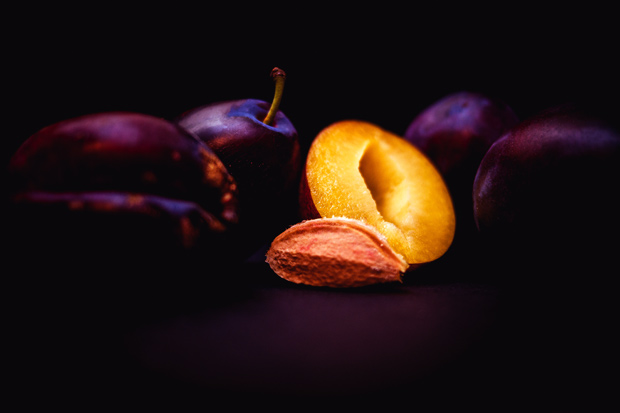
How to Juice Plums
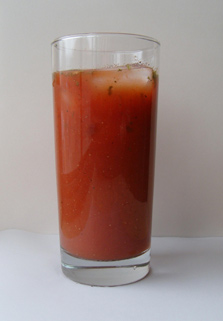 If you are going to juice plums you have two choices: use a juicer or use a blender. I don’t recommend preparing nectar from cooked plums, as it can be incredibly sweet and thus not healthy at all.
If you are going to juice plums you have two choices: use a juicer or use a blender. I don’t recommend preparing nectar from cooked plums, as it can be incredibly sweet and thus not healthy at all.
Ingredients
- 1 pound plums without the pits
- filtered water
- one inch of ginger
Instructions
After rinsing the plums, de-pit them and put them in your blender or juicer. Add some ginger, previously peeled. If you use a blender add some water. If you are going to juice them, add water to dilute the juice afterward. If you can help it, drink it without any sugar or sweeteners. Drink the juice straight away for maximum health benefits.
Making June Plum Juice (Video)
Here’s is another recipe that seems to work great with green plums.
Useful Tips
- When you juice Plums, don’t throw away the pulp. Use it either with your juice, or separately because the pulp is a fantastic source of fiber.
- You can freeze prune juice for several weeks, but plum juice should be used as soon as possible. If you decide to keep it in your freezer, drink it within 24 hours.
- Plum juice is not the best choice if you have gout. If you have gout you should avoid high fructose fruits, such as peaches, pears, dates, grapes, and plums. You should limit your daily intake of plum (and prune) juice.
Possible Side Effects
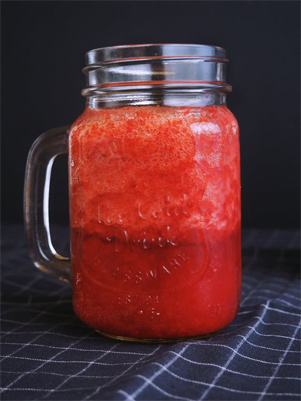 Plums are oxalate rich food. with moderate to high oxalate content [4].
Plums are oxalate rich food. with moderate to high oxalate content [4].
If you have problems with kidney or gallbladder stones and other complications related to oxalatic acid, you should avoid Plums and Plum Juice or consume them in moderation.
Plum juice can be a safe choice during pregnancy, but there are some aspects of it that need further consideration. First, if there is too much sugar in the brand you choose or in your home made juice, it would be wise to avoid it. Second, there might be too much vitamin A, which is known to have some adverse effect during pregnancy if taken in higher doses.
Giving plum juice to your baby is probably not a good idea. The main food of your baby should be breastmilk, not juice of any kind, and certainly not commercial juice, with or without sugar.
The Bottom Line
Bowel movements can become difficult to manage as one ages. Drinking a glass of prune juice each morning helps make stool easier to pass regularly to remove any toxic substances in your body and keep intestines clean. Moreover, you will be able to reap the benefits of the other health benefits of Prune Juice as well.
To your health!
References
[1] Identification of phenolic compounds in plum fruits (Prunus salicina L. and Prunus domestica L.)…
[2] A high-cholesterol diet enriched with polyphenols from Oriental plums (Prunus salicina)…

Leave a comment